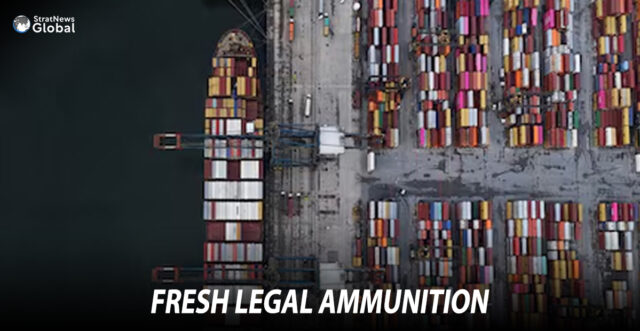U.S. President Donald Trump threatened Brazil with 50% tariffs this month in response to the prosecution of his political ally, former President Jair Bolsonaro—a move that, while expressing Trump’s frustration, could offer legal ammunition to challengers seeking to dismantle the core of the White House’s tariff agenda.
Trade law experts and plaintiffs in a federal court challenge to Trump’s sweeping tariffs, which are backed by the 1977 International Emergency Economic Powers Act (IEEPA), say the president’s outburst against Brazil is another prime example of him far exceeding any legal authority to levy tariffs.
“It just shows that the president really thinks that he has unconstrained power to tariff. That’s a big problem for our clients, but also it’s a big problem for the rule of law,” said Jeffrey Schwab, senior counsel and interim director of litigation at the nonprofit Liberty Justice Centre.
Schwab is representing five small businesses that won the first round of a legal challenge to Trump’s use of IEEPA to impose sweeping “reciprocal” and fentanyl-related tariffs on nearly all U.S. trading partners. Schwab said he expects the threatened U.S. tariffs on Brazil to come up during oral arguments before the U.S. Court of Appeals for the Federal Circuit in Washington on Thursday.
The New York-based Court of International Trade found in May that Trump exceeded his legal authority by using IEEPA, but the appeals court has allowed the tariffs to remain in place while the case plays out – likely all the way to the U.S. Supreme Court.
The ruling, if it stands, could blow a hole in Trump’s tariff blitz, which so far has extracted concessions from a number of major trading partners, including Japan, the European Union, Indonesia, Vietnam and Britain. South Korea, Canada and Mexico are racing to negotiate deals with Trump to avoid steep tariff hikes on August 1.
‘This Brazil Nonsense’
The 50% tariff that would apply to Brazil on August 1 is the highest “reciprocal” rate announced by Trump, matched only by tiny Lesotho. Brazil is hoping to negotiate a deal to reduce the duties, but has acknowledged that it may not happen before the deadline as Trump focuses on larger trading partners.
The stakes are high for Brazil because the U.S. is the country’s second-largest trading partner after China.
Trump announced the Brazilian tariffs after a week of public feuding with President Luiz Inacio Lula da Silva, the leftist leader who narrowly defeated Bolsonaro in a 2022 election.
A week after Lula’s inauguration, Bolsonaro supporters stormed government buildings in Brasilia in an alleged plot to reinstate the right-wing former military officer as president. Bolsonaro is currently on trial in connection with the alleged coup and has been forced to wear an electronic ankle bracelet restraint. He has denied all the charges.
In a July 9 letter to Lula announcing the tariffs, Trump said the trial was a “Witch Hunt that should end IMMEDIATELY!” The U.S. president cited Brazil’s “insidious attacks on Free Elections and the fundamental Free Speech Rights of Americans” and “unlawful censorship orders” on U.S. social media platforms.
The letter did not specify whether the tariffs would be imposed under the IEEPA national emergency that Trump declared over the large and growing global U.S. trade deficit.
Trump has not issued a formal executive proclamation, and a White House spokesperson did not respond to a request for comment on the matter.
But the letter contained some language identical to tariff letters issued to other countries, explaining that the import levies were necessary to correct “unsustainable Trade Deficits against the United States.”
The U.S. has had consistent goods trade surpluses with Brazil since 2008, with a $6.8 billion surplus in 2024. Brazil was initially subjected to a 10% tariff as part of Trump’s “Liberation Day” tariff announcement in early April.
“The bottom line for me is, yes, I believe the plaintiffs can and will use this Brazil nonsense as further evidence that these tariffs are being imposed at the absolute whim of the president,” said Jennifer Hillman, a trade law professor at the Georgetown University Law Centre.
The 50% Brazil duties “bear no relationship to a national emergency in the United States,” Hillman said. “They have nothing to do with a trade deficit, even if you can define a trade deficit that we’ve been running consistently for 50 years as unusual and extraordinary.”
Daniel Esty, a professor at Yale Law School, said that even if an argument can be made for trade deficits as a national emergency under IEEPA, Trump’s tariffs to punish Brazil for acting against a former president are not legal.
“That is so clearly outside the bounds of the law as to be shocking,” Esty added.
Hillman served as counsel to a group of 191 Democratic lawmakers who filed an amicus brief in the appeals case, arguing, among other things, that Congress never intended for IEEPA to delegate tariff authority to the president, as there were other laws in place to deal with it.
The Court of International Trade followed this reasoning, and found that the fentanyl-related tariffs levied against China, Canada and Mexico failed to deal with an IEEPA national emergency that Trump declared over the deadly opioid.
(With inputs from Reuters)





